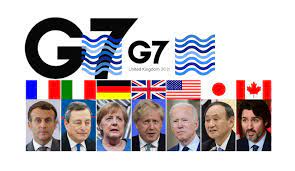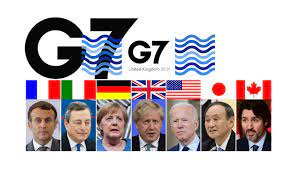
G7 leaders decided on Tuesday to consider imposing worldwide price limitations on Russian energy imports to limit Moscow's ability to pay its invasion of Ukraine and to contribute up to $5 billion to alleviate global food hunger.
The crisis in Ukraine and its catastrophic economic effects, particularly skyrocketing food and energy inflation, have dominated this year's summit of the group of rich democracies in a Bavarian Alps castle resort.
According to a piece of the final G7 declaration seen by Reuters, the European Union would discuss with international partners options to reduce Russian energy prices, including the prospect of imposing temporary import price ceilings. Officials stated that this included both oil and gas.
The G7 has been considering price caps as a means of preventing Moscow from benefitting from its invasion of Ukraine, which has drastically risen energy prices, softening the impact of Western measures to reduce Russian oil and gas imports.
Russian oil export income increased in May despite lower export volumes, according to the International Energy Agency's June monthly report. more info
A ceiling on the price other nations pay Russia for oil would reduce "resources that he has to wage war and, secondly, promote stability and security of supply in global oil markets," a senior US administration official said on Tuesday.
The plan aims to link financial services, insurance, and oil cargo shipping to a cap on Russian oil prices. If a shipper or importer desired these services, they would have to agree to Russian oil being sold at a certain maximum price.
Italy, whose economy is heavily reliant on Russian energy, lobbied for the price cap to be extended to gas.
Last week, Italian Prime Minister Mario Draghi spoke of the need to address energy prices in order to manage inflation, and claimed the primary argument to a gas cap from fellow Europeans was concern that it would lead Russia to decrease supply even further.
France has stated that the price cap mechanism should be extended beyond Russian products in order to decrease prices more broadly, particularly for G7 nations seeking alternative energy sources.
France accepts the language in the final communique, although it is unclear how such a mechanism would work, according to a French official.
An EU official said on Tuesday that G7 leaders had also agreed to press for a restriction on Russian gold imports as part of attempts to intensify the sanctions grip on Moscow.
At the opening of the G7 summit on Sunday, Britain, the United States, Japan, and Canada agreed to prohibit imports of newly mined or refined Russian gold, but the European Union expressed doubts.
The G7 countries, which account for roughly half of global economic activity, seek to increase pressure on Russia without exacerbating already-rising inflation, which is causing stresses at home and savaging poorer economies.
According to UN Secretary-General Antonio Guterres, there is a "serious possibility" of numerous famines this year, as the Ukraine crisis has exacerbated the detrimental impact of climate issues and the COVID-19 epidemic on food security.
According to a senior US official, the G7 will pledge up to $5 billion to improve global food security, with the US donating more than half of that amount, which will go to efforts to combat hunger in 47 countries and fund regional organisations.
The G7 is aiming to unite rising countries, many of whom have close relations to Russia, to oppose Putin's invasion of Ukraine, and has invited five key middle-and-low-income democracies to the meeting in order to gain their support.
Some are more concerned about the impact of rising food costs on their populace, blaming the shortages on Western sanctions than than Russia's invasion of one of the world's top grain producers and blockade of its ports.
When asked if G7 leaders had discovered a solution to allow Ukraine to export grain, British Prime Minister Boris Johnson responded, "We're working on it, we're all working on it."
According to the US official, the G7 leaders have also decided to take a more coordinated strategy to confronting China's "market-distorting" tactics in global trade.
"You'll see leaders release a collective statement, which is unprecedented in the context of the G7, acknowledging the harms caused by China's non-transparent, market-distorting industrial directives," the official said on Tuesday.
One of their obligations was to increase efforts to remove forced labour, particularly state-sponsored forced labour, from global supply chains, according to the official.
(Source;www.usnews.com)
The crisis in Ukraine and its catastrophic economic effects, particularly skyrocketing food and energy inflation, have dominated this year's summit of the group of rich democracies in a Bavarian Alps castle resort.
According to a piece of the final G7 declaration seen by Reuters, the European Union would discuss with international partners options to reduce Russian energy prices, including the prospect of imposing temporary import price ceilings. Officials stated that this included both oil and gas.
The G7 has been considering price caps as a means of preventing Moscow from benefitting from its invasion of Ukraine, which has drastically risen energy prices, softening the impact of Western measures to reduce Russian oil and gas imports.
Russian oil export income increased in May despite lower export volumes, according to the International Energy Agency's June monthly report. more info
A ceiling on the price other nations pay Russia for oil would reduce "resources that he has to wage war and, secondly, promote stability and security of supply in global oil markets," a senior US administration official said on Tuesday.
The plan aims to link financial services, insurance, and oil cargo shipping to a cap on Russian oil prices. If a shipper or importer desired these services, they would have to agree to Russian oil being sold at a certain maximum price.
Italy, whose economy is heavily reliant on Russian energy, lobbied for the price cap to be extended to gas.
Last week, Italian Prime Minister Mario Draghi spoke of the need to address energy prices in order to manage inflation, and claimed the primary argument to a gas cap from fellow Europeans was concern that it would lead Russia to decrease supply even further.
France has stated that the price cap mechanism should be extended beyond Russian products in order to decrease prices more broadly, particularly for G7 nations seeking alternative energy sources.
France accepts the language in the final communique, although it is unclear how such a mechanism would work, according to a French official.
An EU official said on Tuesday that G7 leaders had also agreed to press for a restriction on Russian gold imports as part of attempts to intensify the sanctions grip on Moscow.
At the opening of the G7 summit on Sunday, Britain, the United States, Japan, and Canada agreed to prohibit imports of newly mined or refined Russian gold, but the European Union expressed doubts.
The G7 countries, which account for roughly half of global economic activity, seek to increase pressure on Russia without exacerbating already-rising inflation, which is causing stresses at home and savaging poorer economies.
According to UN Secretary-General Antonio Guterres, there is a "serious possibility" of numerous famines this year, as the Ukraine crisis has exacerbated the detrimental impact of climate issues and the COVID-19 epidemic on food security.
According to a senior US official, the G7 will pledge up to $5 billion to improve global food security, with the US donating more than half of that amount, which will go to efforts to combat hunger in 47 countries and fund regional organisations.
The G7 is aiming to unite rising countries, many of whom have close relations to Russia, to oppose Putin's invasion of Ukraine, and has invited five key middle-and-low-income democracies to the meeting in order to gain their support.
Some are more concerned about the impact of rising food costs on their populace, blaming the shortages on Western sanctions than than Russia's invasion of one of the world's top grain producers and blockade of its ports.
When asked if G7 leaders had discovered a solution to allow Ukraine to export grain, British Prime Minister Boris Johnson responded, "We're working on it, we're all working on it."
According to the US official, the G7 leaders have also decided to take a more coordinated strategy to confronting China's "market-distorting" tactics in global trade.
"You'll see leaders release a collective statement, which is unprecedented in the context of the G7, acknowledging the harms caused by China's non-transparent, market-distorting industrial directives," the official said on Tuesday.
One of their obligations was to increase efforts to remove forced labour, particularly state-sponsored forced labour, from global supply chains, according to the official.
(Source;www.usnews.com)





